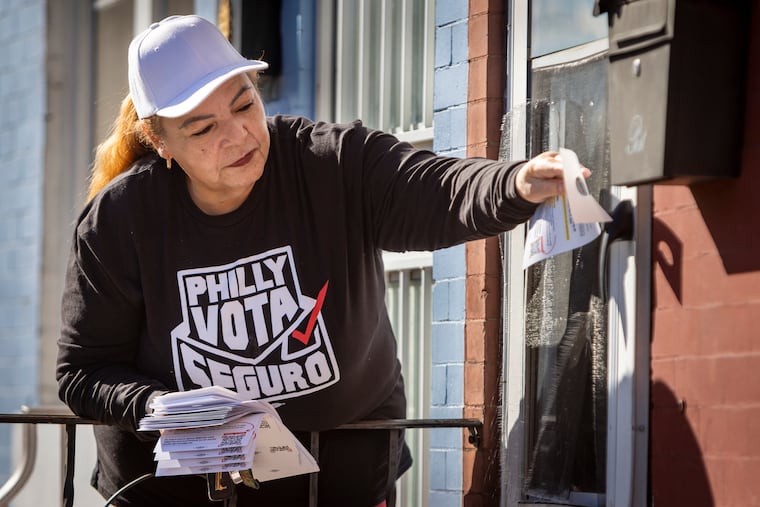Democrats are used to ignoring Latinos. They do so at their peril.
Many Latinos feel left out and disconnected from the city’s political establishment due to apathy and inaction by Democrats on critical economic and neighborhood issues.

The election of Cherelle Parker — the city’s first Black female mayor — shows that representation matters to Philadelphia voters. However, when we look at who sits on City Council, an obvious question comes to mind: Why has an at-large seat been so elusive for a Latino representative even as Philly’s Latino population has nearly tripled since 2000?
Latinos make up more than 16% of the city’s population, living in and outside of the 7th District (the city’s historic barrio in Northeast Philadelphia). Yet adding a second Latino voice on Council has become a new glass ceiling after the election of Maria Quiñones Sánchez to the 7th District Council seat in 2007.
Even with such a large Latino presence in Philadelphia, Quetcy Lozada, who replaced Quiñones Sánchez after she resigned to run for mayor, remains the only Latina on the 17-member Council.
Some may say it’s a problem of engagement. The general election results show that the average turnout in Latino-dominant wards was about 13% of registered voters. That’s lower than the city’s overall turnout by half, but when you talk to Latino voters, many will tell you that they are taken for granted. That their voices aren’t being heard and they feel locked out of politics.
In a city controlled by Democrats, it is evident who holds the key.
It’s not a leap, then, to say that Philadelphia’s Democratic Party, and the varying factions of the progressive movement, conspire to keep Latinos out of power. Of course, when faced with these claims, they will sneer and name their endorsed Latino candidates. But the reality is that those efforts are merely lip service, a box to check while the political machine delivers votes to their preferred candidates.
The Democratic Party has been adversarial to Philadelphia’s broader Latino community, choosing to back machine candidates (like Manny Morales, in his 2015 primary bid against Quiñones Sánchez) and mostly ignoring Latinos in neighborhoods outside of its tightly controlled system.
Many Latinos feel left out and disconnected from the city’s political establishment due to apathy and inaction by Democrats on critical economic and neighborhood issues. When an opportunity came to endorse two qualified Latinas (Erika Almirón and Luz Colón) to their coveted slate of five candidates for at-large Council seats, the party instead chose to leave a blank space and let ward leaders pick their preferred candidate. An endorsement would’ve made a huge difference in vote share and shown that the party was listening to Latinos.
The city’s “progressives” haven’t fared much better, contributing to the level of frustration and disengagement by ignoring the kind of bread-and-butter issues that Latinos (many of whom are severely impacted by poverty, the drug trade, and violence) desperately want addressed.
Instead, progressives chose to spread themselves thin, focusing on an unpopular mayoral candidate (Helen Gym) and an inexperienced Council at-large candidate (Amanda McIllmurray), instead of fully backing at-large Latino candidates with a real shot at winning, such as Almirón.
Some local progressive groups are taking credit for increasing turnout on Nov. 7 (even while Philadelphia’s share of the statewide Democratic vote continues to decline), as more of the electorate came out to cast ballots for the Working Families Party. But an Inquirer analysis found that votes came from wealthier, predominantly white wards.
As we look at those results, we should ponder why white middle-class Philadelphia voters are setting priorities for working families, and more importantly, whether candidates who bill themselves as “for the people” will deliver, not just for gentrifying middle-class voters, but for those the system continues to trample on.
The Democratic Party and the progressive wing have been losing ground with working-class and Latino voters locally, and national patterns show a similar trend. In Philly and across the country, Democrats have prioritized super voters and engaged individuals — who tend to skew white and highly educated — again leaving a gap in representation for a growing Latino population.
Pennsylvania will play a critical role in next year’s presidential election, and helping protect democracy from the Republicans’ likely nominee will require reversing Philadelphia’s declining turnout trends by engaging and empowering the city’s diverse communities.
So consider this a call to the Philadelphia Democratic Party and the progressive political machine.
Will you address the issues low-income and working-class Philadelphians have been struggling with for decades, or will you choose performative politics? Will you listen to Latino voices calling out for their fair share, or will you continue to ignore us?
Esperamos su respuesta.
Rafael Álvarez Febo is vice president for advocacy and community development at Esperanza. He was executive director of Gov. Tom Wolf’s LGBTQ commission and was an adviser for Maria Quiñones Sánchez’s mayoral campaign.